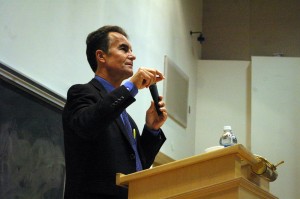
Bernd Wollschlaeger remembers the day in 1972 when the newspaper headline read: “Jews killed in Germany, again,” after the Munich massacre. Most of the people in the audience shook their heads in remorse, probably for a second time, because they were alive when it first happened.
The Jewish author and physician told his story at FAU on the Boca campus this past Sunday, Feb. 5, as part of the Raddock Family Eminent Scholar Chair on Holocaust Studies Lecture series. Wollschaleger spoke about his book, “A German Life” and his journey to find the truth about his father’s involvement in Nazi Germany as a military officer.
Despite the fact that his lecture caught the interest of those who could qualify for Denny’s daily 20 percent off meal for senior citizens, there was one student in sight at the event.
Most students were likely partying for the glorious game on Super Bowl Sunday, but junior Toni Strzelewic attended Wollschlaeger’s lecture to gain extra credit for her Hitler in Nazi Germany class.
“I actually enjoyed the lecture,” the English and history double major said. “I learned a lot and it’s part of my past because I’m also Jewish, it helps connect.”
The one hour lecture, followed by a short Q&A session and book signing, told the story of how Wollschlaeger found out out what Nazi Germany was really like during World War II, which was different from his father’s version of the story. Wollschaleger eventually cut ties with his family, and after seven years of dedication to the Jewish faith, he converted from Catholicism to Judaism and became an Israeli citizen.
Even though not many young people were there, Wollschlaeger had a message for them anyway.
“Ask questions; don’t necessarily follow what people do,” he said. “Understand when hatred and animosity toward anyone begins, not only if they are Jews or Muslims, but towards anybody that acts different, looks different, or speaks a different language. Look how to develop tolerance.”
Wollschlaeger’s story is presented as part of the Holocaust Studies Lecture series, but he hopes it’s not always seen as that.
“I hope my story is timeless and not attached to a certain generation but that it has a message that will be able to address anybody, any age, any gender.”












